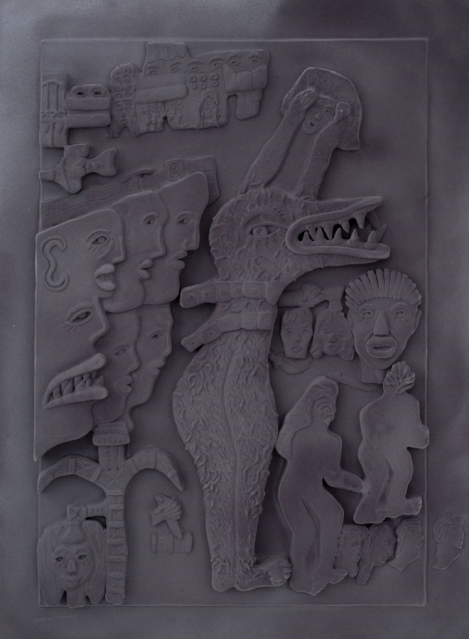Mamali Shafahi's Heirloom Velvet
As I said in my last post, I'm taking a brief break from my 'Art fatigue' articles to take a look at Mamali Shafahi's new Heirloom Velvet works, featured by Dastan at Liste in Basel this year alongside some of Reza Shafahi's sketches.
I've already written about Mamali's work with his dad, Reza, in a post entitled Reza Shafahi: from retired wrestler to 'outsider' artist, focusing on Reza's work, rather than Mamali's. Here, I'll be looking at Mamali's own recent work.
As I explained in the earlier article, as a part of his long-term Daddy Sperm project, Mamali asked his father Reza, a former wrestler then 72, to start drawing. The idea was basically to see if any genetic link emerged in their work. Since then, Reza has developed his own artistic practice, following his own inspiration. Meanwhile, Mamali has developed the project through successive stages and various media: an exhibition of paintings: Occidental Icons (2012), a video installation of Daddy Sperm (2013), and Nature Morte (2014-2017) an 80-minute docu-fiction, in which both of his parents are actors.
As Mamali has involved his parents more directly and deeply in his own projects, progressively transforming them into actors and artists, they have become one of his main artistic media. At the Palais de Tokyo, Nature Morte was incorporated scene by scene into a 300-square-metre installation of sculptures, objects and custom-designed furniture, opening with Mamali announcing to his father: ‘I’m pregnant’, on a screen beside a giant, custom-built wall of his father’s drawings. The whole family was present for the opening.
Now, in the latest turn of this intergenerational screw, Mamali, who through the bridge his parents represent is learning more about his own classical inheritance (while still pursuing his ‘avant garde’ work combining social media and virtual reality), is starting to produce works strongly influenced by his father’s, deliberately pushing for significant ambiguity as to who is really responsible for the outcome. ‘There is a kind of confidence in my dad's works which I admire a lot and even makes me almost jealous of him as an artist! He doesn’t even retouch his paintings. As an outsider, with his lack of academic conditioning, he is free from the doubts I may have as an ‘establishment’ artist,’ Mamali says.









Comments
Post a Comment